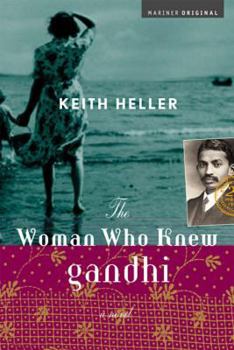The Woman Who Knew Gandhi
Select Format
Select Condition 
Book Overview
Based on an aside in Mahatma Gandhi's autobiography, in which he mentions a brief but seductive youthful flirtation with an Englishwoman, The Woman Who Knew Gandhi boldly imagines a long correspondence between a spiritual leader from the East and an ordinary woman from the West. In 1948, just after Gandhi's assassination, Martha Houghton receives a letter from Gandhi's son, who himself lies dying of tuberculosis in Bombay. Having found a stash...
Format:Paperback
Language:English
ISBN:0618335455
ISBN13:9780618335459
Release Date:January 2004
Publisher:Harper Perennial
Length:207 Pages
Weight:3.10 lbs.
Dimensions:0.5" x 5.5" x 8.2"
Customer Reviews
3 ratings
Rethinking Friendships, Relationships and the Past
Published by Thriftbooks.com User , 16 years ago
A friend of mine mentioned this book to me because his book club was reading it. Upon hearing the title, the premise sounded intriguing and I picked it up at the library. I had no idea that I would discover such a treasure and do not understand why this book was not on the best seller list. Reading it was like watching an Academy Award Winning Judi Dench movie and if its ever made into a movie, she would be ideal for the main character, Martha. As is obvious from the title, the book deals with a British woman in the late 1940's who has shared a friendship with Gandhi in her youth. Unbeknownst to her husband, the friendhip continued over 5 decades, mostly through letters. The novel centers on the time period immediately after the death of Gandhi when Martha's husband, family and friends find out about the relationship and how they are changed by the knowledge. Martha discovers her true friends and also discovers a great deal about her children and her husband. There are a number of underlying themes that the prosepective reader might want to watch for that will enhance their enjoyment of the work. One is aging - dealing with getting old and how people and relationships change over time. Another is the extent to which something a person did in their earlier life affects their contemporary relationship - do relationships change because of the infusion of some piece of knowledge? Readers should also consider the concept of forgiveness - that is if you think that Martha did something for which she has to seek forgiveness. There is also the theme of male/female relationships - can such a relationship exist without sexual overtones and be purely plutonic? Sprinkled throughout the novels are the subplots of imperalism - the relations between the Britain and India and of course sutble racism. If you don't like the word imperalism, you might want to substitute exchange of cultures - how did the British and Indian cultures mix and how did this effect the relationship between Martha and Gandhi and the Martha's family's view of the relationship? Would they have treated the knowledge of the relationship the same if the person she knew in the past was Churchill or any other white male who became famous or not so famous? Everyone who reads this novel will stop and consider some past relationship and perhaps reevaluate current relationships. Would your current relationship survive a situation such as the one in the novel? Can a relationship of many years totally change because of one conversation? Was there perhaps a distrust between Martha and her husband Samuel all the time? I would offer one caveat to the reader, try to read the book in the contxt of the time in which it is set - 1948. If you try to impose 21st century values on the characters, you will perhaps judge them too harshly. But no matter what the context, I'm sure you will come away dwelling into your own past. And for those romantics, like myself, there is the ever present q
American Classic Novel
Published by Thriftbooks.com User , 19 years ago
This novel has every element of a classic American novel. Post-war England is contrasted with the newly independant India. The characters are multi-dimensional, unlike too many "cardboard" characters in current writings. Character development is a key element of the novel, though the plot is engrossing as well. The reader is drawn into the story from page one and each page has some pithy observation which the reader is eager to discuss with someone else. There are subtle leit-motivs if one is inclined to look for them. Besides the philosophical comparisons of various marriages, religions, countries, values, happiness, there seem to be subtle questions about loyalty to one's country, mate, family, history and other human importances. This is a book that I will read again, even though there are yet so many unread books out there. After a marathon of reading this summer, finding this gem outweighs all the precious time spent reading mediocre books. After reading the last paragraph of this book I was reluctant to begin another. What can follow perfection?
A wonderful read
Published by Thriftbooks.com User , 20 years ago
I stumbled across this book in a store-- I hadn't heard anything about it. And so I was surprised at how great it was. Keith Heller is a beautiful, understated writer and this is a really "satisfying" (as Elizabeth Berg says on the front) book. It's about the two sides of love, the practical and spiritual sides, and how one woman must reconcile them. I highly recommend this novel if you like subtle, rich, elegant writing and reading about the extraordinary moments of ordinary lives.




